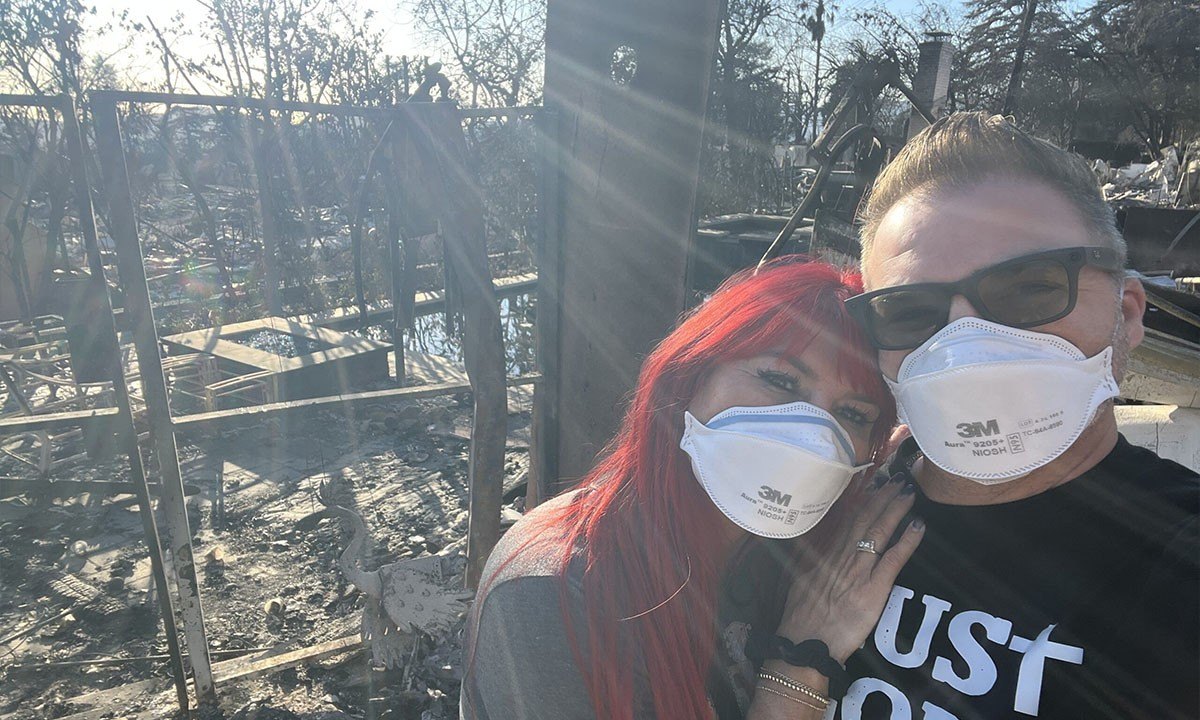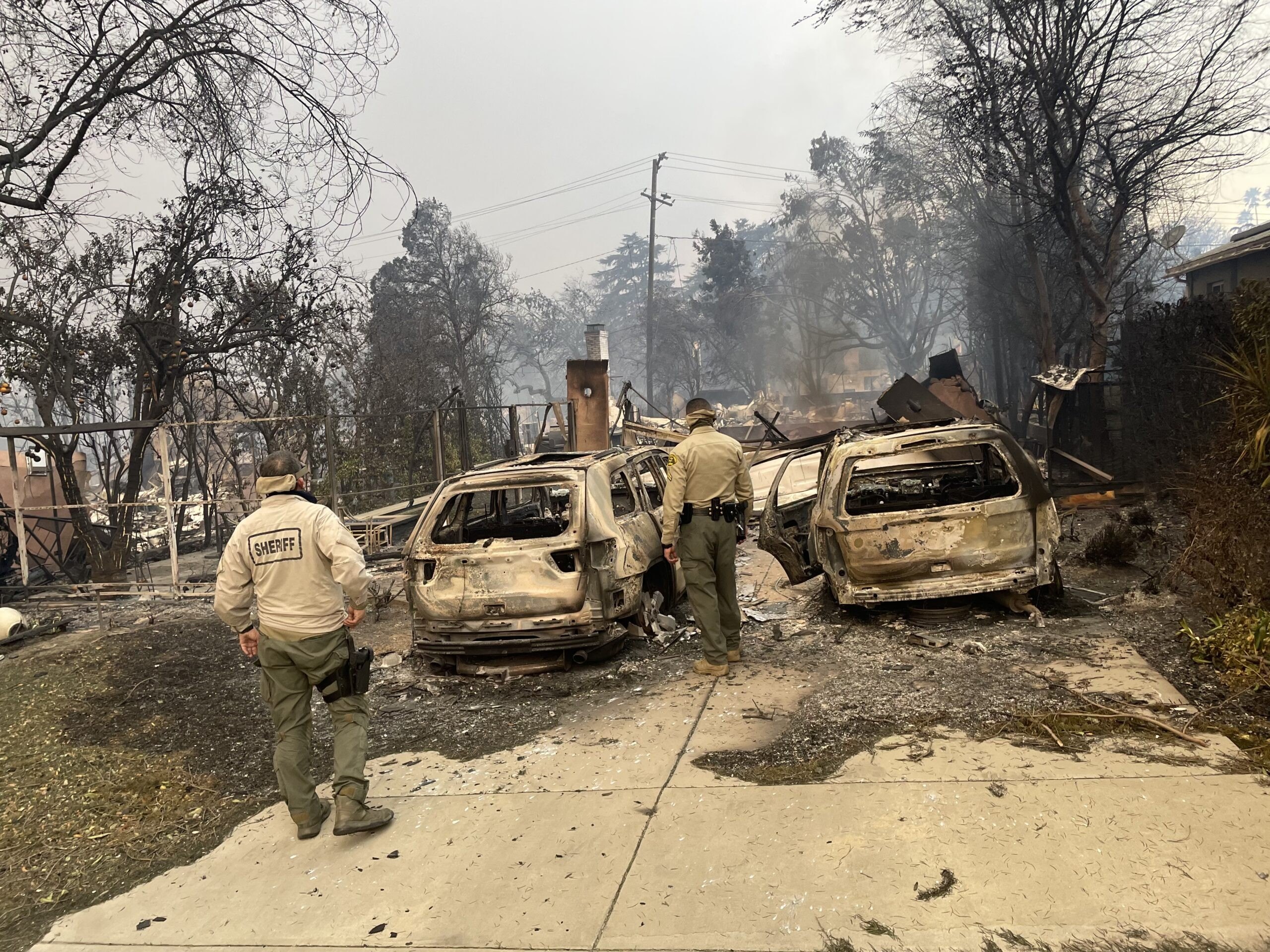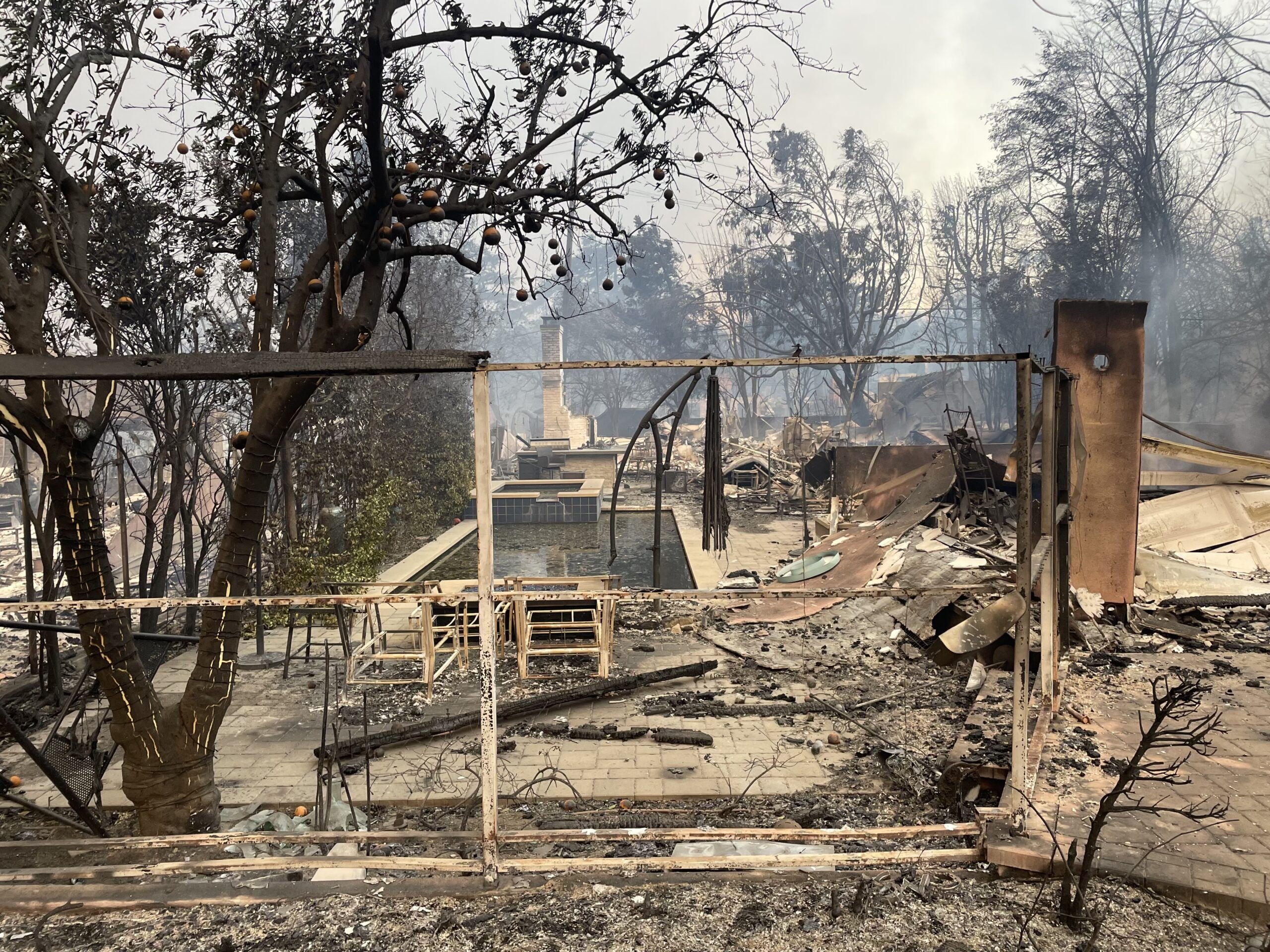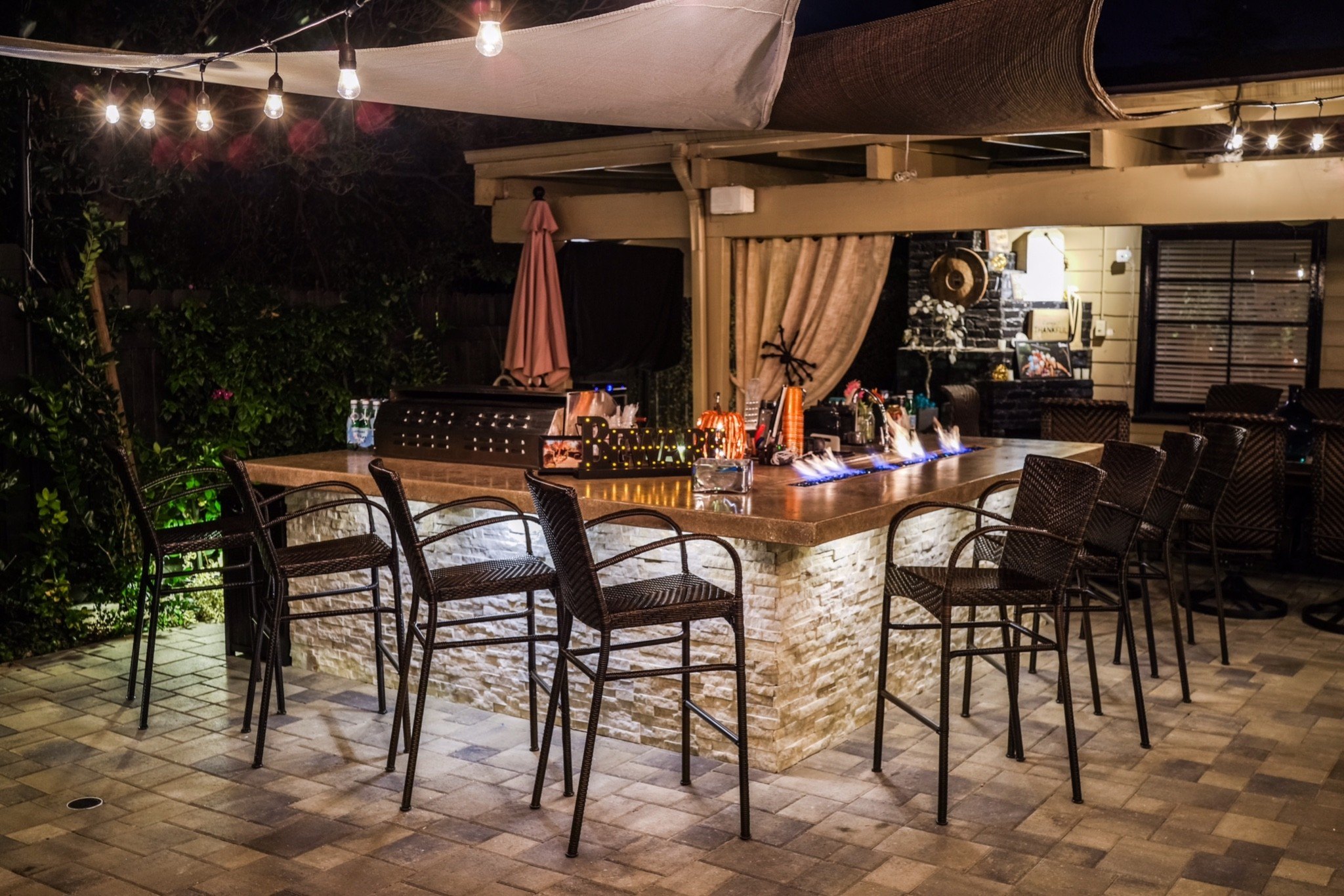
Tera & Cory Bonilla
For the first time in 14 years, Tera and Cory Bonilla didn’t have to work on New Year’s Eve. So, they took the rare opportunity to head to Hawaii at the invitation of friends.
The plan was to rest and regroup. Instead, their lives were upended when they lost everything as the Los Angeles wildfires ripped through their neighborhood thousands of miles away.
The couple, who are from Altadena, CA, own a successful corporate entertainment company, The Red Hot Band. They tell Realtor.com® that on the morning of Jan. 7, while they were in Kona, HI, they heard that a wildfire had hit Pacific Palisades, CA.
“We heard there was a fire in the Palisades, but that’s so far from us in the Pasadena/Eaton area,” says Tera.
So, the couple went to a fitness class. By the time they got out, their phones were “blowing up” with messages.
“My sister called me and was like, ‘I think the fire is right next to your house’, and we were like, ‘What?’. We had no clue another fire had started,” says Tera, who then called a neighbor, Roberto. He told her that the wind was blowing at 90 mph, and everyone in the neighborhood was packing up their cars and leaving.
It was then that the realization hit the Bonillas—they were thousands of miles away, and there was nothing they could to do save their property.

(SUPPLIED)

(SUPPLIED)
Begging the neighbors to break and enter
The couple frantically texted friends and neighbors to see whether anyone could help rescue some of their personal items. But friends said the area was already too dangerous, with fallen trees and power lines, traffic backing up, and the rapidly spreading flames.
“People were so scared,” says Tera.
Finally, their neighbor, Roberto, agreed to go to their house.
“He was losing service, and there was no power, there were no lights; so he would say, ‘What do you want?’ and then he would run into the house and try to look around in the dark, and then he’d have to come back outside to call again,” says Tera.
Cory adds that Roberto watched as the inferno grew, and they told him to “get out of the house” to save himself.
In the end, Roberto managed to grab two computers and a couple of hard drives. That alone saved a large part of the Bonillas’ business and information they would need in the future to rebuild their lives.
From carefree vacation to stressful house watch
The Bonillas spent the rest of their vacation obsessively checking their Ring doorbell footage, saying it was like watching a Netflix show in real time. Eventually, the Ring footage, which had gone from showing smoke in the distance to a red glow, went out.
Not long after, a neighbor messaged at 3:30 a.m., saying, “My house is on fire Tera, our street is on fire, the whole block is on fire.”
Tera recalls: “I think we just knew then, though you have that tiny little hope, like maybe our house was the one saved.”
At 5 a.m. on Jan. 28, they received another message: “Everything’s gone.”
Tera’s sister, a former sergeant in Orange County who now lives in Idaho, made some calls to colleagues in the Los Angeles area who were able to get up to Tera and Cory’s home to take photos later that day. Before hitting send, she told Tera to “prepare yourself.”
Their “oasis” was utterly demolished.

(SUPPLIED)

(SUPPLIED)
From dream home to dust
The Bonillas bought their three-bedroom, two-bath, 1,760-square-foot Altadena home in 2010 for $560,000. They then saved for five years to invest another $100,000 in the home by adding a pool and an outdoor area that they called the “oasis.”
“We really did want the house to serve others and to be a place that people would feel comfortable and loved,” says Tera. “We had baptisms, weddings, birthday parties, baby showers, and even my grandparent’s memorial there—it was just a really amazing house.”
In 2020, it also became a “home studio” for their business. Not only did it house all their costumes, DJ gear, and sound equipment, but they “hosted” virtual events from the “oasis” to bring joy to people via Zoom during the COVID-19 pandemic.
“It was like our business and our home all burnt down in the same day,” says Cory.

(SUPPLIED)
Taking a breath to figure out the next steps
With no home to return to, the couple remained in Hawaii for another five days while they assessed their options.
“We had no place to live, so we just didn’t know what to do,” says Tera. “I think we were grieving, and I was so shocked—I kept thinking, ‘We’re still going home, right?’”
What they didn’t expect, however, was the support they’d find themselves surrounded by.
“We are so blessed to have such a huge village—I’ll cry when I talk about it—I just kind of can’t believe how many people have been so generous,” says Tera. “They’ve offered everything—we probably had 40 people offer us a place to live.”
Their sound man even offered them his RV.
They finally settled on first staying at a friend’s home in Manhattan Beach, CA, since it was close enough for them to get to the remains of their old home—but far enough away to have clean air and a peaceful atmosphere.
“We had three suitcases with swimsuits and coverups. That’s all we had left in the world,” says Tera.

(SUPPLIED)
Starting the recovery process
Despite losing everything, the Bonillas feel they are more fortunate than some of the other victims because they had fire insurance on their home.
The total insured losses from the Palisades and Eaton fires currently range from $35 billion to $45 billion, according to CoreLogic. The wildfires also put $40 billion of real estate value at risk, according to a new report from the Realtor.com® economic research team.
Tera’s aunt was their insurance agent, so they were immediately able to assess what was needed to file a claim. But, even with that head start, they’re overwhelmed.
“It’s like we were given a full-time job that we didn’t apply for,” says Cory.
They have even started scrolling through photos on their phones—to find proof of items they owned—searching for digital receipts, and scouring bank statements.

(SUPPLIED)
What’s harder for Tera to process is the loss of her wedding dress, her wedding albums, and her wedding ring. She is also mourning the loss of handmade gifts and sentimental notes.
“I lost all my love letters from Cory—like I saved every card he’s ever given me,” she adds.
Cory suggests that people get a passport card in addition to their passport—and keep them in separate locations. That’s because they’re now learning the hard way how complicated it is to get a passport replaced—even one that was lost in a fire.
“If it’s in the ‘lost or damaged’ category, you still have to start all over like you’re applying for a new passport,” says Tera.
Losing your home is expensive
Obviously, the loss of a huge investment like a home is a massive financial hit. But there are other expenses Cory says people don’t think about—like rent on top of a mortgage.
“I think the difficult thing that you don’t really think about is you’re still paying a mortgage, property tax, and now rent on a new place to live in because you don’t have a home,” says Cory.
They do have a clause in their insurance policy that allows for some rent reimbursement, but it’ll depend on whether they get the “max” amount for their claim.
Additionally, both of the couple’s cars were paid off; but those were destroyed in the fire, so now they’ll have to add car payments back into their monthly expenses.
Even if they get reimbursement on their home at full appraisal value, it’ll still be less than the market value of what they could have sold it for pre-fire.
“It’s scary to spend money right now because even with this amazing GoFundMe that people started for us, we don’t know what to do yet,” says Tera. “We don’t have furniture, we don’t have a place to live, we don’t know what we’re going to need. There are a lot of expenses we’re not sure about, so we’re trying to just wait and be patient and, honestly, not panic.”
Trying to keep moving forward with hope
On top of all this trauma, Tera and Cory are also attempting to work.
“We still have to work—to do our gigs and go onstage and perform, acting like nothing happened, making other people happy, making them smile,” says Cory.
As for what’s next, they’re really not sure if they’ll try to rebuild—or cut their losses and move.
“That’s the biggest pingpong because we’re back and forth on it daily,” says Cory. “I think to get the most for our money, we should probably rebuild because you’re not going to get what it would be worth if there was a home there; but then our town is completely gone, so you’re talking five years before it starts to resemble a town again, 10 [years] before it starts thriving again. It’s really hard.”
Tera and Cory say the good news, however, is that they don’t have to make the decision right now.
“I mean, we don’t even know where we’re living in March,” says Tera. “But I feel like, even though we lost everything, what we were left with was each other, our friends, our family, and more love than we could ever possibly imagine, so we still feel beyond grateful.”



